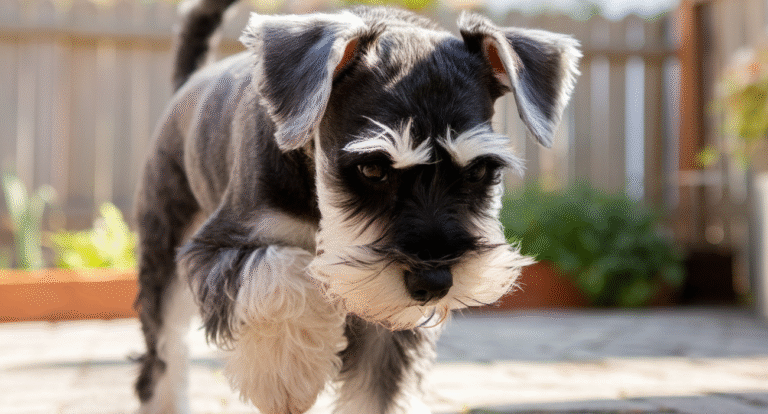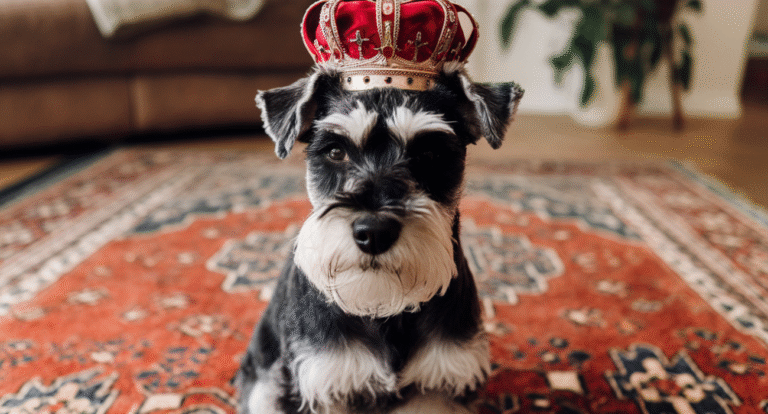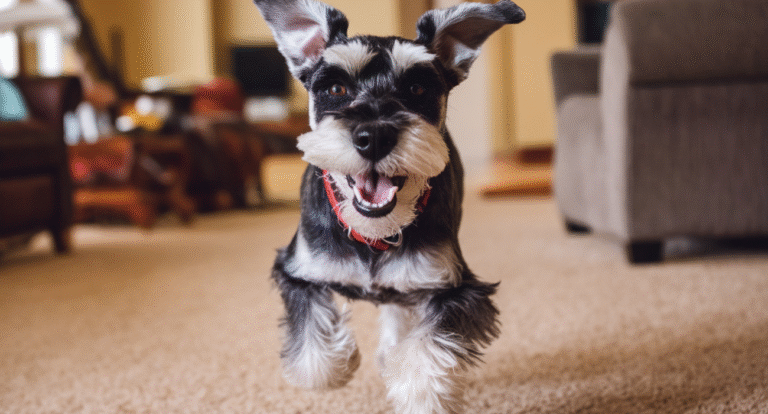The right food can boost energy, improve health, and even extend your schnauzer’s life. Here’s how to make it happen.
Have you ever seen your Miniature Schnauzer zoom around the living room, beard bouncing, eyes sparkling, and tail wagging like a tiny propeller? That kind of joyful energy does not just come from love and belly rubs. The secret ingredient is proper nutrition. Feeding your Schnauzer the right way can keep their coat shiny, their body lean, and their playful spirit going strong for years.
But here’s the thing about Miniature Schnauzers: they’re not just small dogs with big personalities. They come with their own set of nutritional quirks and health considerations that make feeding them more like solving a delicious puzzle than simply pouring kibble into a bowl.
These compact canines descended from working farm dogs in Germany, bred to catch rats and guard property. Today’s Mini Schnauzers still carry that energetic work ethic in their compact 11 to 20 pound frames. Their metabolism runs hot, their digestive systems can be sensitive, and their appetite for life (and food) is enormous.
Here are 12 game-changing nutrition tips tailored just for your Miniature Schnauzer.
1. Choose a High-Quality, Low-Fat Diet
Your Schnauzer’s pancreas is basically the drama queen of their digestive system. Miniature Schnauzers are genetically predisposed to pancreatitis, a painful inflammation that can turn mealtime from joy to emergency vet visits.
The fat rule is simple: keep dietary fat below 10% for dogs with a history of pancreatitis, and below 15% for healthy prevention. Your Schnauzer’s pancreas will thank you with years of comfortable digestion.
Look for foods specifically formulated for small breeds or those labeled “low fat” or “lean.” Brands like Hill’s i/d Low Fat, Royal Canin Digestive Care, and Blue Buffalo Life Protection Formula Small Breed all offer excellent options. Read those ingredient labels like you’re studying for a final exam.
2. Watch Those Portions Like a Hawk
Free-feeding your Schnauzer is like leaving a chocolate factory unlocked with Willy Wonka inside. These dogs have zero self-control when it comes to food, and their compact size means every extra kibble shows up around their waistline.
Most adult Mini Schnauzers need between 1/2 to 1 cup of high-quality dry food daily, split into two meals. But here’s where it gets tricky: that range depends on age, activity level, and metabolism. A couch potato Schnauzer needs far less than one who thinks they’re training for the Westminster Dog Show every day.
| Weight Range | Daily Food Amount | Calories per Day |
|---|---|---|
| 11-15 lbs | 1/2 – 3/4 cup | 300-400 calories |
| 16-20 lbs | 3/4 – 1 cup | 400-500 calories |
Measure with an actual measuring cup, not that old coffee mug you’ve been eyeballing. Your Schnauzer’s figure depends on precision.
3. Prioritize Protein Power
Your Schnauzer needs protein like a race car needs premium fuel. These energetic little athletes require high-quality protein to maintain their muscle mass and support their active lifestyle.
Look for foods where real meat appears as the first ingredient. Chicken, turkey, salmon, and lamb are excellent choices. Avoid foods that list “meat meal” or “by-products” as primary protein sources. Your Schnauzer deserves better than mystery meat.
Adult Mini Schnauzers should get foods with at least 18% protein, but many benefit from higher levels around 22-26%. Puppies and active adults need even more, sometimes up to 28% protein content.
4. Navigate the Carb Maze Smartly
Not all carbs are created equal, and your Schnauzer’s waistline knows the difference. While these dogs need some carbohydrates for energy, too many simple carbs can pack on pounds faster than you can say “treat time.”
Good carbs include sweet potatoes, brown rice, quinoa, and oats. These provide steady energy without blood sugar spikes. Avoid foods heavy in corn, wheat, or white rice, which offer little nutritional value and can contribute to weight gain.
Think of carbohydrates as your Schnauzer’s energy savings account. Complex carbs make steady deposits, while simple carbs are like spending sprees that leave your pup hungry an hour later.
5. Resist Those Pleading Eyes
Those soulful brown eyes and that perfectly groomed beard can melt even the strongest resolve. But sharing your dinner with your Schnauzer is like giving a toddler espresso: it seems harmless until chaos ensues.
Human food often contains garlic, onions, excessive salt, or dangerous artificial sweeteners like xylitol. Even “healthy” people food like avocado or grapes can be toxic to dogs. Your Schnauzer’s digestive system is designed for dog food, not last night’s pizza.
If you absolutely must share, stick to plain, cooked chicken breast or small pieces of carrot. But honestly, your Schnauzer will be just as thrilled with their regular kibble served with enthusiasm and praise.
6. Treat Smart, Not Hard
Treats should be the seasoning of your Schnauzer’s diet, not the main course. Aim for treats to make up no more than 10% of daily calories, which for most Mini Schnauzers means about 30-50 calories in treats per day.
Excellent low-calorie options include:
- Baby carrots (crunchy and satisfying)
- Apple slices without seeds (remove the core)
- Green beans (fresh or frozen, not canned)
- Small pieces of cooked sweet potato
- Commercial treats specifically designed for small, sensitive breeds
Training treats should be tiny, about the size of a pea. Your Schnauzer cares more about the praise and attention than the size of the reward.
7. Boost That Coat with Omega-3s
A Schnauzer without a magnificent coat is like a superhero without a cape. Those distinctive eyebrows and beard need proper nutrition to stay lustrous and healthy.
Omega-3 fatty acids from fish oil, flaxseed, or chia seeds can transform a dull coat into something that sparkles. These healthy fats also reduce skin inflammation and can help with allergies that plague some Schnauzers.
Add a small amount of fish oil to their food (follow dosage instructions on the bottle), or choose a dog food that already includes omega-3 sources. You’ll see the difference in about 6-8 weeks.
8. Water: The Forgotten Nutrient
Fresh, clean water should be available 24/7. Schnauzers are active dogs who can dehydrate quickly, especially during play sessions or warm weather. Their small size means they can’t afford to lose much fluid before feeling the effects.
Change the water daily and wash the bowl regularly. Some Schnauzers are picky about water temperature or prefer moving water from a fountain-style bowl. Pay attention to your dog’s preferences and accommodate them.
9. Prevent Urinary Stones Before They Start
Miniature Schnauzers have a genetic tendency toward urinary stones, particularly calcium oxalate stones. While you can’t change genetics, you can absolutely influence outcomes through diet.
Avoid foods high in purines, such as:
- Organ meats (liver, kidney, heart)
- Sardines and anchovies
- Some game meats
Choose foods that promote urinary health with balanced mineral content. Many veterinary diet brands offer formulations specifically designed to prevent stone formation.
Think of urinary health like maintaining a swimming pool. The right chemical balance prevents problems, while ignoring the balance leads to expensive repairs later.
10. Vegetables: Nature’s Multivitamins
Small portions of safe vegetables can add fiber, vitamins, and variety without excess calories. Think of vegetables as nutritional boosters that make regular meals more interesting and healthful.
Schnauzer-safe vegetables include:
- Green beans (great for weight management)
- Zucchini (low calorie, high water content)
- Pumpkin (excellent for digestive health)
- Broccoli florets (in moderation)
- Sweet bell peppers
Steam or lightly cook harder vegetables, and always introduce new foods gradually. Start with tiny amounts to avoid digestive upset.
11. Consistency Prevents Chaos
Your Schnauzer’s digestive system thrives on routine. Sudden diet changes can trigger diarrhea, vomiting, or worse, a pancreatitis flare-up in susceptible dogs.
When switching foods, follow the seven-day transition rule:
- Days 1-2: 75% old food, 25% new food
- Days 3-4: 50% old food, 50% new food
- Days 5-6: 25% old food, 75% new food
- Day 7: 100% new food
This gradual transition allows the digestive system to adjust to new ingredients and prevents gastrointestinal rebellion.
12. Your Vet is Your Nutrition MVP
Every Schnauzer is unique, like snowflakes with attitudes and facial hair. What works perfectly for your neighbor’s Mini might be completely wrong for yours. Regular veterinary check-ups help you fine-tune nutrition based on your specific dog’s needs.
Discuss with your vet:
- Current body condition and ideal weight
- Any digestive sensitivities or allergies
- Activity level and life stage nutritional needs
- Supplement recommendations
- Signs to watch for that indicate dietary problems
Annual blood work can catch developing issues before they become serious problems, allowing dietary adjustments that keep your Schnauzer healthy.
Fuel for a Lifetime of Adventures
Proper nutrition sets the stage for everything wonderful about living with a Miniature Schnauzer. Each carefully measured meal, each thoughtfully chosen treat, each bowl of fresh water contributes to more years of beard kisses, living room zoomies, and that distinctive Schnauzer swagger.
Your Mini Schnauzer trusts you to make the right choices for their health and happiness. With these nutrition secrets in your toolkit, you’re giving them the fuel they need to be their most vibrant, energetic, and delightfully stubborn selves for many years to come. After all, a well-fed Schnauzer is a Schnauzer ready to take on the world, one enthusiastic bark at a time.






